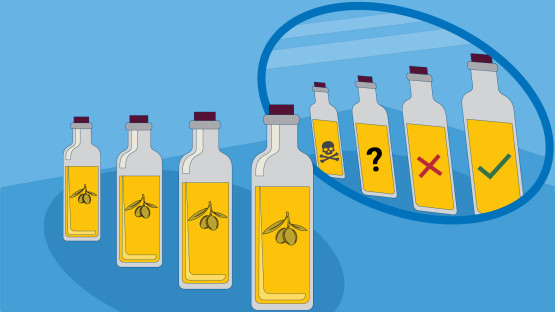When consumers buy food, they cannot always detect food fraud. (Infographic: Mariia Platonova/IAEA)
The adulterating of food products for financial gain, either through dilution, substitution, mislabeling, or other action, has become a lucrative industry. And because food fraud is designed to avoid detection, gauging its financial impacts can be difficult. Experts estimate that food fraud affects 1 percent of the global food industry at a cost of about $10 billion to $15 billion a year, with some estimates putting the cost as high as $40 billion a year, according to the U.S. Food and Drug Administration.
Dongyu Qu, director general of the FAO (center left) with Rafael Mariano Grossi, director general of the IAEA and Najat Mokhtar, deputy director general and head of the IAEA Department of Nuclear Sciences and Applications (far right) on the sidelines of the World Food Forum. (Photo: D. Calma/IAEA)
The International Atomic Energy Agency and the Food and Agriculture Organization of the United Nations launched Atoms4Food on October 18 at the 2023 World Food Forum in Rome as a flagship initiative to help boost food security and tackle growing hunger around the world. Atoms4Food will support countries as they apply nuclear techniques to boost agricultural productivity, reduce food losses, ensure food safety, improve nutrition, and adapt to the challenges of climate change.
A Northrop Grumman Antares rocket, with the Cygnus spacecraft Sally Ride aboard (so named for first American woman to fly in space), launched at 5:32 a.m. EST on November 7, from NASA's Wallops Flight Facility in Virginia. The rocket is captured just after liftoff in this still image from NASA’s live broadcast of the event.
Seeds from the joint laboratories of the International Atomic Energy Agency and the Food and Agriculture Organization of the United Nations (FAO) are onboard a Cygnus spacecraft launched from NASA’s Wallops Flight Facility in Virginia early on November 7. Now orbiting the Earth en route to the International Space Station, the seeds are part of a commercial resupply mission with a payload that includes resources to support more than 250 scientific investigations.





